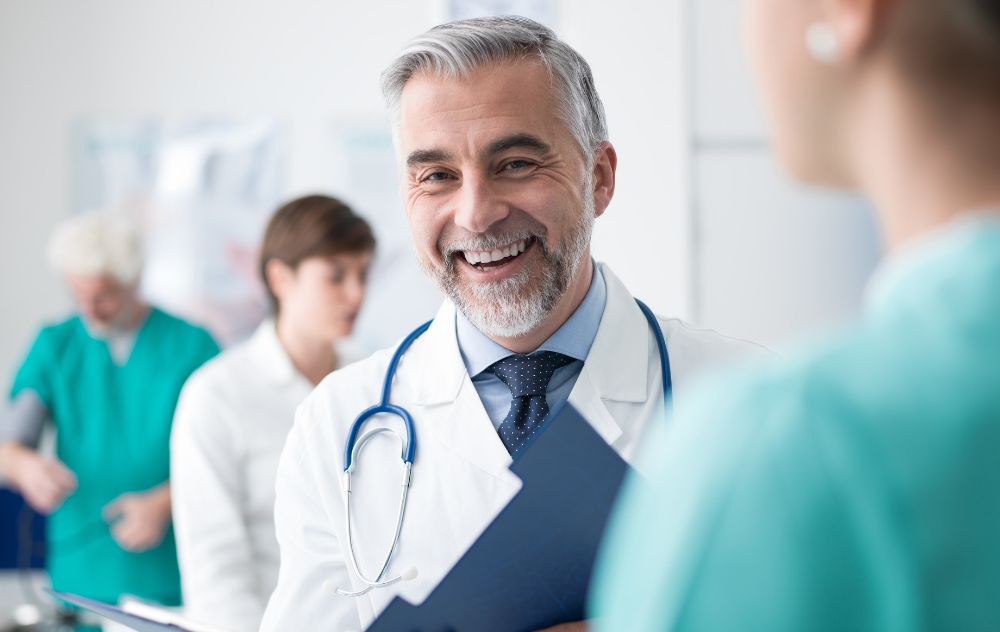
Have you been diagnosed with varicosities? If so, you may be wondering what this means. Varicosities –– also known as varicose veins, venous varicosities, varices, and variscosis –– are twisted, enlarged veins at the skin surface. They usually develop in the lower extremities and typically appear swollen and raised, and with a bluish-purple or red color.
But did you know that varicose veins are not just cosmetic; they can also cause painful and uncomfortable symptoms. Additionally, the presence of varicosities can indicate underlying vein disease, or venous insufficiency. While vein disease is not in itself considered a serious condition, it can lead to dangerous health issues if it is not treated.
Below, we provide a wealth of information on varicosities, vein disease, and minimally-invasive vein treatment. If you suspect you have a varicosity, we recommend visiting a vein specialist for a full medical evaluation.
What Is a Varicosity?
A venous varicosity, or varicose vein, develop when veins aren’t functioning properly. Veins have tiny –– but important! –– one-way valves are responsible for returning deoxygenated blood to your heart.
When vein valves are placed under strain, they are unable to do their jobs effectively. As a result, your blood can begin to back up in certain regions and eventually the blood begins to pool in place. Most often, the legs or lower extremities are affected.
Over time, these veins can expand and develop into varicose veins, or varicosities. Along with noticing visible varicosities, you may also experience painful and uncomfortable symptoms.
Warning symptoms of vein disease include:
- Swelling in the legs and ankles
- Tired, aching legs
- Numbness or tingling sensation
- Difficulty standing for long periods
- Non-healing wounds on your legs
- Burning in the calf or thigh
- Leg pain that improves when you walk or raise your legs
If you suffer from any of these problems, it is important to contact your doctor or a vein specialist. When left untreated, varicosities have the potential to lead to dangerous health conditions like blood clots and venous ulcers or leg ulcers which are caused by problems with blood flow or circulations in your legs.
One serious type of blood clot that can occur is known as Deep Vein Thrombosis (DVT). DVT is considered potentially life-threatening and requires immediate medical attention.
Another issue that patients with advancing varicosities can develop is a venous ulcer. These are open, non-healing leg wounds that place you at risk for skin and blood infections.
To avoid potential complications related to vein disease, we recommend consulting a USA Vein Clinics specialist.
Causes of Leg Varicosities
As discussed above, varicosities can develop when vein valves are placed under strain. This strain can occur as a result of both lifestyle and genetic factors. Developing varicosities in pregnancy is also quite common.
Known risk factors for varicosities include:
- A family history of varicose veins
- An unhealthy Body Mass Index (BMI)
- Getting older
- Pregnancy
- Being a woman
- Other health conditions like diabetes or high blood pressure
- Smoking
- A poor diet
- Lack of physical activity
- Prolonged periods of standing or sitting
If you are concerned about your vein health, we suggest contacting your doctor to receive personalized recommendations. Certain lifestyle modifications like losing excess weight, exercising regularly, and eating a healthy diet may help reduce your venous risks. Additionally, minimally-invasive vein treatment can improve or even eliminate symptoms of varicosities.
UNDERSTANDING YOUR VENOUS SYSTEM
Definitions of Venous Terms
When doctors use many different names for the same or similar health conditions, we understand that this can create confusion. Here are some definitions for common venous terms that your specialist may use during your appointment.
- Venous insufficiency: This term describes a condition in which your veins are unable to efficiently send blood back to the heart. It can lead to pain, swelling, and the development of venous varicosities.
- Vein disease: Often used interchangeably, vein disease is caused by venous insufficiency. It can result in painful and uncomfortable symptoms like leg swelling, skin discoloration, restlessness, itching, cramping, and fatigue.
- Varicose veins: Also called varicosities, these swollen, enlarged veins can develop when blood begins to pool in the lower extremities. Individuals with varicose veins often experience leg pain, swelling, and other undesirable symptoms.
- Spider veins: Spider varicosities, or spider veins, are small, colorful veins that typically appear just below the skin’s surface. They can look similar to a spider web and develop anywhere on the body. Although often painless, spider veins can sometimes cause pain or discomfort.
Treatment for Varicosities
If you believe you have a varicosity, the best thing to do is consult a vein specialist for personalized recommendations. Unfortunately, varicosities will not disappear on their own and can put you at risk for dangerous complications. Because varicose veins is a progressive disease you don’t want to wait and ignore them.
At USA Vein Clinics, we offer specialized care and treatment for varicosities and other venous conditions. Our world-class vein specialists perform a range of minimally-invasive, office-based treatments that can quickly alleviate your symptoms. Best of all, our treatments take only 15 to 30 minutes. Afterward, you can return to most normal activities.
Our nationwide network of 90 clinic locations makes vein treatment surprisingly convenient. We also offer the ease of telemedicine consultations for your initial and follow-up visits. We want you to know that most treatments are covered by major health insurance plans, including Medicare and Medicaid.
To learn more about varicosities and potential treatment, please give us a call at 888.768.3467 or schedule an appointment online. We look forward to helping you improve your vein health!





